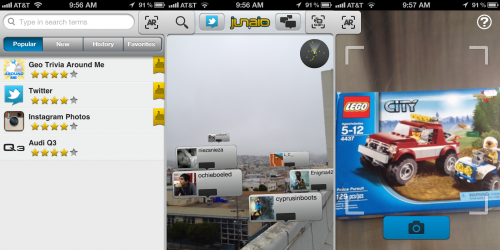June 21, 2012 report
Augmented reality browser Junaio has new look

(Phys.org) -- The new version of the augmented reality (AR) browser Junaio launched this week with more promise of easy immersive browsing with mobile devices. The idea is to merge via smartphone the vastness of the Internet into the real world, or to browse the world as one does the Internet. Metaio, the company behind Junaio, says the new release represents “the most advanced AR browser and open development platform.” The browser is designed to bring AR into the everyday world of experiences such as gaming, finding buildings, ordering off a restaurant menu, and walking in the right direction to the subway. Junaio was first released back in 2009 and has built up adoption among smartphone users and developers. Junaio uses have included scanning Quick Response (QR) codes, navigating environments, and discovering augmented content in print.
The Junaio release is said to be available for iOS and Android devices, but, in the case of Android, has some limitations. Junaio is disabled on the HTC Hero, Magic, Wildfire and Tatoo. The key user feature in the new update is an improved user interface, with a menu that is easy to navigate. A person can at startup start scanning targets, codes, and content. The initial menu has pared down functions to viewing content in the viewfinder; searching for channel-specific content; and scanning QR codes or signs.
The browser is an open platform for smaller AR apps coded by independent developers. As such, the relaunch is positioned as news for developers as well. The new release includes support for HTML5 and JavaScript, designed to give developers additional tools.The company says it has over 10,000 active content developers building on top of Junaio’s API.
Analysts are generally enthused over the future of AR, which is a likely motivator for developers. Gartner finds augmented reality as one of the Top 10 strategic information technologies. Juniper forecasts that AR industry revenue will be driven by AR games, and will reach $1.5 billion by 2015. Metaio is no stranger to the AR marketplace. Founded in 2003, with offices in Munich and San Francisco, it calls itself the world leader in augmented reality solutions. Junaio’s success is attributed to the way it taps GPS, image recognition, visual search and other AR elements and merges them all. The company claims that over 10 million consumers use its AR-technology.
“Mobile users should be able to browse life like the Web,” says Trak Lord, head of US Marketing & Media Relations for Metaio. “This latest version of Junaio is the first major step to making that a reality.”
More information: www.junaio.com/
© 2012 Phys.Org



















